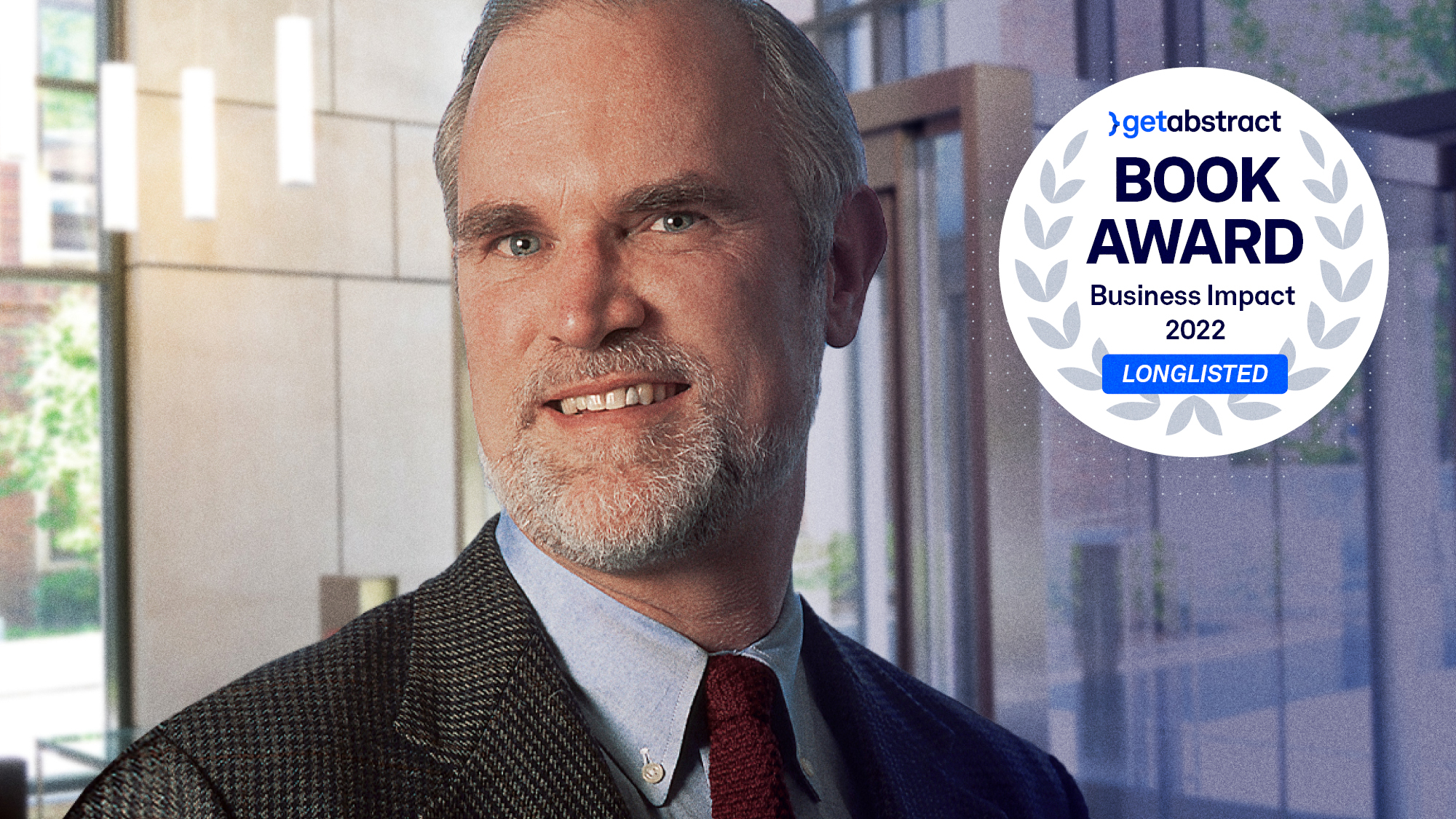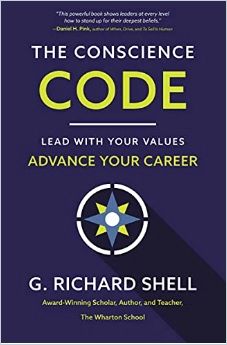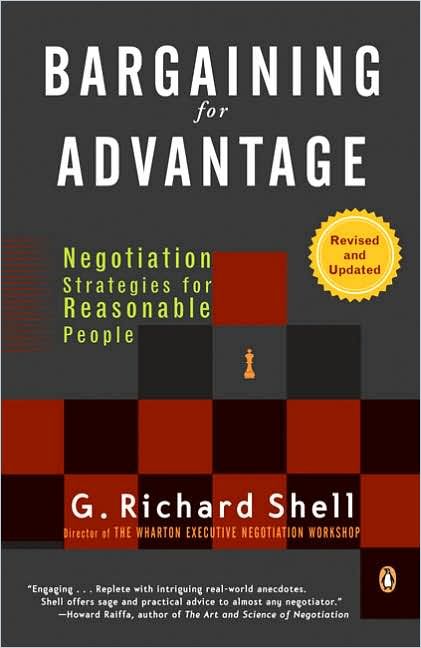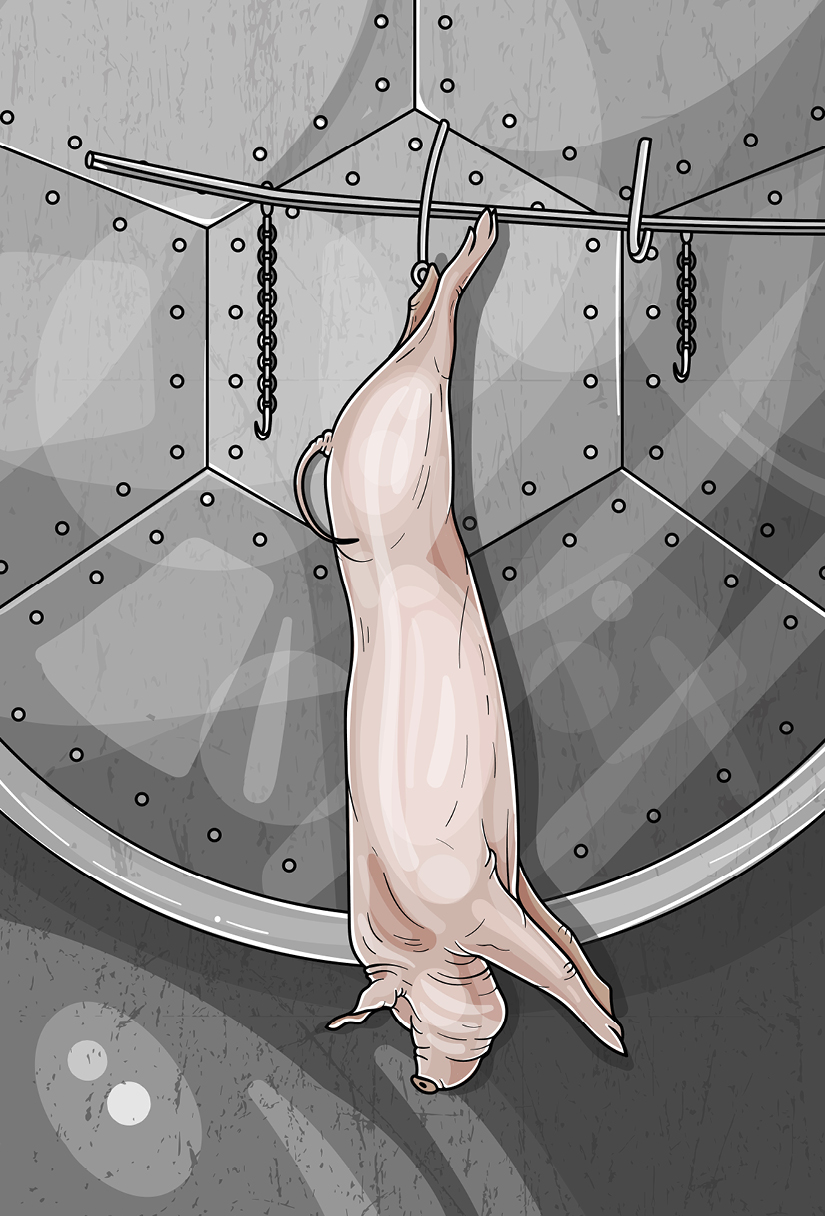“You Don’t Have to Be Old and Wise to Do What’s Right.”

Richard, what prompted you to write your latest book, The Conscience Code?
G. Richard Shell: The book comes out of a course I teach to Wharton MBA students on leadership and responsibility. In one of the classes, I have students discuss a moral or ethical conflict that they or someone close to them had experienced. Out of those discussions come some amazing and disturbing examples of what they have been pressured to do at work. What’s more, I’ve discovered that perhaps a quarter of the students say that they’ve come to Wharton to escape a toxic culture or boss, or an unethical and corrupt work environment. They are using the MBA program as a pivot to try to find a more professional environment, one that aligns with their values. After hearing these stories year after year, I began keeping notes of these examples. I realized that there was a book to be written that incorporated other topics I have studied and written about, including negotiation, persuasion, interpersonal influence and organizational culture.

How has your background in negotiation and influence helped you develop this very practical guide on ethical conduct in the workplace?
Conflicts over values in the workplace are very consequential types of conflicts, but ultimately, creating an effective conscience code is not unlike driving any other initiative through an organization, such as a new marketing plan. In the book, I show how to apply all these tools to promote the right values in an organization and protect your identity as a person of conscience when confronting unethical conduct.

Talking to your students, you say it is your strong sense that the percentage of employees who feel pressure to behave unethically is much higher than the 25 percent number cited in a recent Harvard Business Review report. Do you feel that the situation is getting worse?
I think in some ways it is getting worse. The more competitive the global market becomes, the more incentives there are to cut corners and do things you think you might get away with.
You mention tech and finance industries as being among the most prone to engaging in dubious practices. Why these two industries at this particular point in time?
They’re fast-moving and highly competitive. Just look at the example of Elizabeth Holmes and the Theranos organization. The Silicon Valley mantra is ‘fake it until you make it.’ But Theranos was not promoting some video game, but rather a medical device! The company’s leaders lost sight of the fact that people’s lives were at stake in the game of raising billions. They completely lost their way. We don’t know whether Elizabeth Holmes and her chief operating officer were on the psychopath spectrum and didn’t have a conscience, or whether they simply got off track and never realized how far off they were until it was too late.
The more competitive the global market becomes, the more incentives there are to cut corners.
G. Richard Shell
In the book, you make an important point about the two young whistleblowers who cooperated with The Wall Street Journal to bring the scandal to the public.
The whistleblowers were only 22, 23 years old. Their young age drives home the point that you don’t have to be old and wise to do what’s right. You don’t have to be especially courageous to have a conscience and act on it to the best of your abilities. Even people with seemingly little power can do that. Holmes and her COO have since been convicted of fraud in the American courts.
What are some key characteristics of values-based organizations?
Having a value-based organization is a little like having a value-based family. Lots of things can lead your kids astray or cause a parent to forget what their life is really about. What’s important is that you renew your commitment regularly. Articulating your values is not a one-off thing. Religious cultures know that. Practicing Christians go to church every week, Buddhists have their daily meditation, and so forth. That’s because human nature is very complicated. Even in the best of times, well-intentioned people forget what their duties are. People must remain vigilant about what they observe and stay alert to their impulses. They also need to develop the skill of bringing values violations to the forefront without blowing up the organization or their career.
You don’t have to be especially courageous to have a conscience and act on it to the best of your abilities.
G. Richard Shell
Do you have an example of a company that is doing a great job at reinforcing ethical values across the organization?
Very few global organizations succeed at applying a conscience code uniformly throughout all their operations. What you tend to see instead are individual units that are especially well-run and of high integrity. The CEO of LabCorp, a laboratory testing group, does a really good job at renewing the importance of values on a daily basis. He has built a work environment based on trust, where people can talk openly about what is happening. If people feel anxious, they can use an anonymous reporting system to express their concerns. Other than this one example, I think you will need to look for teams run with high integrity at the level of individual units within larger organizations.
Articulating your values is not a one-off thing.
G. Richard Shell
Especially since the pandemic, but already before then, questions of meaning and purpose have become an important topic for employees. Polls indicate that younger generations of employees want to work for companies that are socially responsible and behave ethically. Wouldn’t the need to attract and retain talent incentivize companies to become more hands-on at reinforcing company values such as fairness, honesty and integrity?
Absolutely. I recently heard of a case where a stellar job candidate turned down a very generous offer because the employer in question did not have a policy addressing climate change. I suspect that the person who was eager to hire the job candidate may now try to convince the board that the company needed to do its part to combat climate change if it wanted to attract the best talent. I think that the 20-30% of my students who have left organizations due to ethical concerns will pick their next employer carefully.
What advice would you give these “ethics refugees” when they look for a job upon graduating from Wharton?
I counsel students against favoring one industry over another when looking for an employer that aligns with their values. The answer is not to pivot to a nonprofit with a shiny social purpose. The stated purpose of an organization tells you little about whether you are dealing with a values-based organization. Organizations with strong, values-based cultures are run by people of high integrity who renew their commitment to their own values on a daily basis. It really comes down to the micro-level level, to daily, person-to-person interactions.
When confronted with unethical behavior, most people know what the right thing to do is – at least in theory. Yet why do so many of us freeze or look the other way?
Each of us has a good angel and a bad angel side to our nature. Our role is to mediate between the two and use our best judgment – which requires self-awareness. We also need the willpower to overrule the temptation to act against our values.
Even in the best of times, well-intentioned people forget what their duties are.
G. Richard Shell
What are some of the outside pressures that prevent us from standing up for our values?
Social psychologists have identified five main pressures that prompt us to do things we shouldn’t do. I use the acronym PAIRS to help people remember what they are. “P” stands for peer pressure. People can be pressured by their peers to perceive the world differently than their senses are telling them what the world is. In one experiment, a group of people was shown two pieces of paper with lines on them. Some of the lines were the same length, and some of them were of different lengths. The experimenters had everybody in the room take turns saying that two unequal lines were equal. When it was the subject’s turn, who was the last person to speak, the subject was more likely than not to go along with the consensus rather than risk a moment of awkwardness. So shyness of conflict, or an unwillingness to buck the trend, can be part of peer pressure.
“A,” then, refers to pressure from authority?
We know that humans are wired to defer to authority. It’s not a moral excuse, but we still have the tendency to do it. You can get into some very deep moral trouble by simply deferring to authority when your values are giving you signals, saying, ‘no, no, no, no, this isn’t right.’
So that leaves us with the “I,” “R,” and “S”…
“I” stands for incentives, which can be money, deadlines, stock price, glory or fame. The “R” stands for the role you’re in. Very often, people will tell you something to the effect of, “Just do your job! Don’t get out of your lane.” You may be an accountant who witnesses sexual harassment and decide – or are being told – that doing something about it is really somebody else’s job.
The stated purpose of an organization tells you little about whether you are dealing with a values-based organization.
G. Richard Shell
And finally, the “S” stands for systemic pressures. These can be a set of immoral or unethical assumptions that are widely held within a particular industry, and people just assume they have to put up with them. An example would be systemic sexism in the Hollywood entertainment business, which was exposed by the #MeToo movement a few years ago. Fighting systemic pressures is very difficult and requires a substantial willingness to form a coalition with others and persist. Systemic pressures require systemic responses. Yet the day-to-day battles happen at the micro level, with everybody reaffirming and recommitting themselves to their values on a daily basis.
You have developed a four-step, values-to-action process that can lead people from perceiving that a value is at risk to taking action to protect it. Could you briefly explain this four-step process?
In my book, I use the acronym ROAD to refer to the four-step process. The first step is to Recognize that there is a value conflict. Next, you need to Own it. Instead of saying, ‘well, it’s not my role,’ or ‘my boss told me to do it,’ or ‘the system is corrupt,’ you decide that you will do what you can to address the issue. There’s a wonderful quote by the African American social activist and tennis great Arthur Ashe:
Start where you are. Use what you have. Do what you can.
Arthur Ashe
Next, you Assess your options and consult with others to, eventually, Decide on an action plan. What this four-step process leaves out, though, is that value conflicts are seldom one-stage events. They usually go through a cycle. So after reporting an incident, for example, you will need to observe the situation and persist if the issue resurfaces.
Many fear they will risk their careers if they speak up. Yet you argue that confronting unethical behavior – even if this comes with negative repercussions – should be considered a growing opportunity, not a setback. How, then, would you reframe the definition of career success?
In the US, people will go through an average of 12 different jobs during their working life. I think the best way to see a career is to view it as a learning journey. If you encounter an obstacle, such as not getting promoted despite working hard, you leave the firm and go elsewhere. Similarly, if you realize your boss is behaving unethically, you try to fix it just like you try to get a promotion. But if you can’t, I think it is your duty to do what you can to align with your values. And if living in accordance with your values requires you to leave the organization, then just think of it as if you didn’t get promoted. And as you continue on to the next step of your career, you are still a person of conscience. You will look back at the experience knowing that you stood up for your values.
What happens to people who decide to stay at their jobs regardless of the moral infractions they witness?
If you ignore unethical behavior, you become complicit in it. Your confidence in yourself as a moral person diminishes. Every day you go to work, you’re suffering a moral injury. You know that you’re not at your best and start doubting who you are. You become a worse parent and a worse partner. You are more likely to lose your motivation and get depressed. If you cannot be proud of yourself, then you’re not pursuing a successful career.
Each of us has a good angel and a bad angel side to our nature.
G. Richard Shell
As an educator, what role do you think universities/business schools should play in preparing students for moments of ethical conflict at the workplace?
I think their role is crucial. Unfortunately, courses on ethics often get a bad reputation. Students assume that they would be treated as if they were bad people who need to be told how to be better. That would be the wrong approach. The most effective way to teach business ethics is based on the recognition that, except for the 3% who are psychopaths, most people want to do the right thing.
If you ignore unethical behavior, you become complicit in it.
G. Richard Shell
Most people know what the right thing to do is once they have come to recognize the problem. It’s really a question of having the self-confidence to stand up for your values. You can’t teach people to be better people, but you can remind them that they have goodness within them and that they need to honor that voice inside them. You will want to show them the big payoff of being a positive influence on others.
About the Author
G. Richard Shell is chair of the Wharton School’s Legal Studies and Business Ethics Department.







